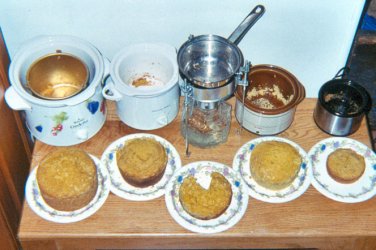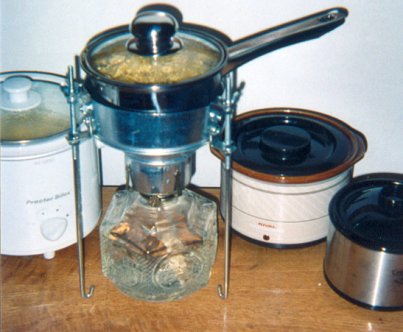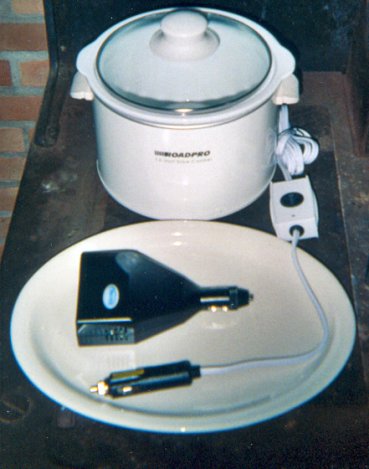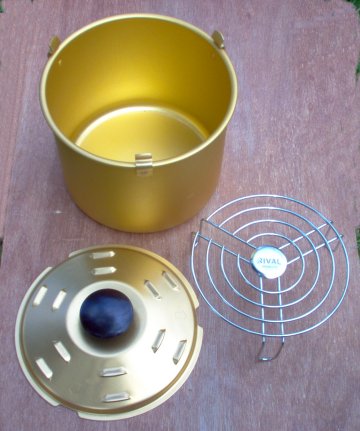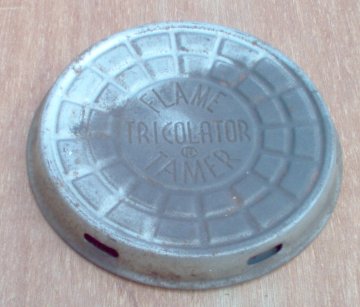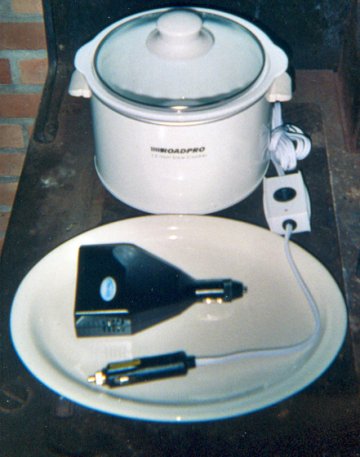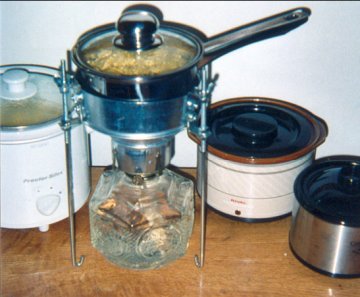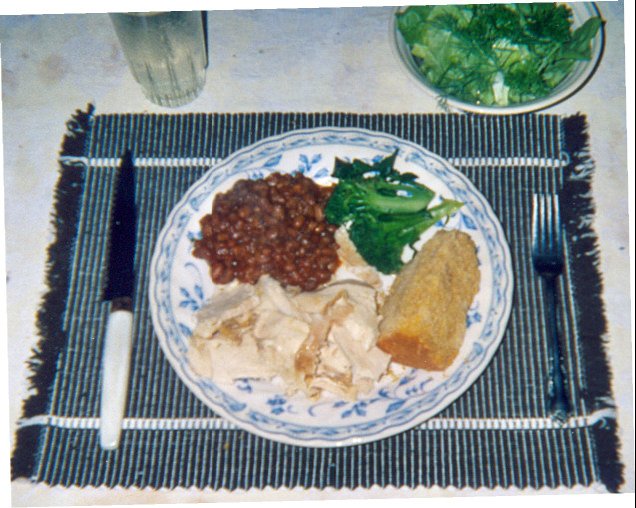|
A guide to self reliant living |
||||||||||||||
|
6. Kerosene heaters and cookers
12.
Electrical; generators
Miles Stair's
SURVIVAL
Miles Stair's
SURVIVAL |
Baking Bread Without an Oven by New England Gardener I was intrigued when I noticed a 'Bread'n'Cake' accessory pan was offered for my Rival crock-pot. I had always thought you needed a 400 degree oven to bake bread. I contacted Rival, but they no longer make them. I did find some on eBay, and won the smaller of the two sizes. The inside is 6 inches in diameter and about 4 and inches tall. On the outside, with the lid in place, they are just over 6 inches tall, including the black knob on top. My first experiment was to bake a loaf of pumpernickel bread. I learned why this kind of bread is baked on a flat surface. It stuck to the pan, but it tasted great. It took 3 hours to cook on the high crock-pot temperature setting. I used a round 3.5 quart slow-cooker, but I had to remove the knob on the 'Bread'n'Cake' pan, so a round 4 quart or larger is really needed. If your pot is oval, better measure carefully. I don't have one of the larger 'Bread'n'Cake' pans here to measure, but they look to be wider, but not taller. {The oval slow cookers are not taller - I had to remove the black knob to make my "Bread'n'Cake' pan fit. Miles} With very small vents on the locking lid, I think these pans may also be ideal to prevent bread baked in a solar oven from drying out during the longer cooking times. The next thing I wanted to try was baking corn bread directly inside the smaller crock-pots. They draw so little electricity; I could run them off a small inverter. My battery can be recharged by solar cells, while running an AC generator for larger loads, or by a small engine driving a automotive alternator. I have a 35 watt Rival 'Little Dipper' pint, a 70 watt Rival 'Crockette' quart, and a 90 watt Proctor-Silex quart and a half. I also included the 3.5 quart model, using the 'Bread'n'Cake' pan, and a kerosene slow-cooker I have been experimenting with. The kerosene model was much faster. In one hour the bread had started to scorch on the bottom. 50 minutes would have been enough. This was a small loaf; the pan I use with this small cooker is only four cups. For more details on this project, see my article [link]. All of the electric models cooked in 2 hours and 20 minutes, except the quart size. That model is much older than the rest, and an updated version was later offered. It needed an extra 30 minutes, which isn't that much slower. There is also a 12VDC Quart and a half size slow-cooker offered by Roadpro. I didn't have one in time for this test, but I found a review that says they cook just fine, but take a little longer. The corn bread came out lightly browned. For long term use, the 'Bread'n'Cake' pan in a solar oven, or the kerosene powered unit make more sense. With the 12VDC model, or an inverter, you can also heat food while driving to your retreat. With the house currant powered slow-cookers, you can start baking whole grain breads now, saving money on both energy and food. It is a very good idea to be eating the same kinds of foods you are storing for the future.
I have been grinding my homegrown rye, wheat, and corn with a hand powered mill and baking for years. There is no comparison in taste and nutrition. Flour which is minutes old, simply tastes much better. The oils released are fresh and taste 'clean'. These breads are very hardy. You don't need much to make a meal. When we had all the animals, I used our own fresh eggs and goat milk to boost the protein, but powdered milk and eggs work fine too. I often add a little flax seed into the mill for its health benefits. Applesauce and cooked pumpkin are both good things to add to soften the bread, and boost the flavor. For me, baking powder spoils the taste, and yeast is very tricky to work with in these breads with little or no gluten. So my bread is heavy, but you make yours how ever you like it. Because of its higher protein, I am experimenting with the grain spelt, and will plant my first trial of it this year. Where I live, no grain is as easy to grow, harvest, and dry, as corn. These small cooking containers are perfect to store the loaf in, until you bake again in a couple days. No need for waxed paper or plastic wrap. The time to start baking your own hearty bread is now! - New England Gardener
[Left, above] The Roadpro brand 1.5 quart Slow-Cooker runs directly off a 12VDC lighter socket. On the platter in front of it, is a small 90 watt inverter which would run 1.5 quart Proctor- Silex, or any of the smaller electric units I used in the test. The removable crocks in those two 1.5 quart units are so close in size; they will interchange between the 125VAC and 12VDC models. You can start baking now with an AC model, and also use it while you are running a generator. If the bread isn't done before you shut down the generator, you can finish with 12VDC power from batteries. Here is the winner of the corn bread bake off. [Center, above] The kerosene powered model cooked in much less time. It also gets hot enough to boil water for hot beverages, and to boil dry beans. [Right, above] This is the real reward from homemade foods! Corn bread baked in a Slow-Cooker, Beans boiled then baked by the Kero Cooker, Broccoli and a salad fresh from the garden. We happened to have left over chicken on the plate too, but this is a well balanced meal without it. New England Gardener.
CORN BREAD RECIPE For every cup of corn meal, add an egg or 3 tsp. of dried eggs. Use up to as much cooked pumpkin or applesauce as corn meal. Left over mashed potato, winter squash work fine too. If you have nothing like that to add, use 2 TBSP. of oil/cup. Slowly add very warm water while stirring, until you have a thick batter. Grease pan. ~~~~~~~~~~~~ Update July 12, 2006 from New England Gardener I made a smaller loaf of spelt bread
today, and it came out very good. It fit in the one quart
Rival pot, which is a little slower than most. Here is
the recipe --- See Also Kero Cooker Boils Beans by New England Gardener
|
1. Food | 2.
Manna Meals | 3. Water |
4. Sanitation | 5. Medical, health |
| 6. Kerosene heaters and cookers | 7. Lighting | 8. Wood cooking and heating | | 9. Communications | 10. Essential Tools | 11. Home built items | | 12. Electrical; generators and power | 13. War preparedness | 14. Gardening |
| HOME |
PROPHECY
| PREPARATIONS
| QUICKENING
NEWS | COMMENTARY
BY MILES |
| GUEST SUBMISSIONS | BOOKLETS BY MILES | CONTACT INFORMATION | | LINKS | RADIATION INDEX & JET STREAM | DEVOTIONAL ITEMS | | PHOTO INDEX | LIBRARY | SURVIVAL SHOP
|
|
||||||||||||


